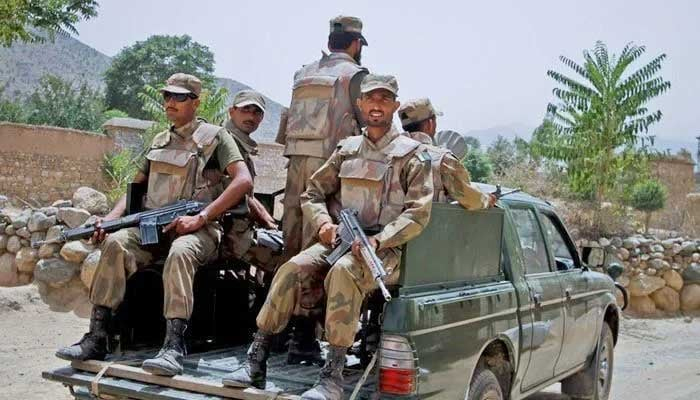Rise in terror
The year that just ended – 2023 – saw an alarming rise in terrorism in the country, an aspect that followed right till the last day of the year when on Sunday (December 31), security forces had an encounter with at least three terrorists in Bajaur. The three men are reported to have been trying to enter Pakistan from Afghanistan, according to a statement released by the ISPR.
While Pakistan’s security forces were able to neutralize the terrorists, the incident has once again exposed the vulnerability of our borders. It also suggests that apparently no measure has been taken by the Afghan Taliban setup across the border against the free movement of terrorists. A day before that, on December 30, Pakistani security forces had killed at least five terrorists in an intelligence-based operation (IBO) in Awaran, Balochistan.
In 2023 alone, militant attacks went up by 69 per cent, according to the report issued by Islamabad-based think tank Pakistan Institute for Conflict and Security Studies (PICSS). Another report – by the Centre for Research and Security Studies (CRSS) –highlights that in 2023 “Pakistan witnessed 1,524 violence-related fatalities and 1,463 injuries from 789 terror attacks and counter-terror operations, including nearly 1,000 fatalities among civilians and security forces personnel.” This new wave of terror has brought several challenges for the Pakistan caretaker government, which is all set to hold elections in February.
Pakistan already has a horrifying history of witnessing terror attacks against contesting politicians, and the latest two consecutive incidents suggest that the country may see an uptick in violence during election campaigns. These fears are backed by sufficient evidence that points to the fact that the security threat is still here, one example of which would be Sunday’s attack on the convoy of JUI-F leader Maulana Fazlur Rehman. Such instances should be avoided at all costs since election delays due to security concerns deprive an entire constituency of having its representatives in the national and provincial assemblies. And with no one to highlight their issues or make a case for funds distribution, these places continue to face challenges.
Pakistan needs to come up with a robust mechanism to fight against terrorism. The uptick in militant violence started soon after the 2021 US withdrawal from Afghanistan and the takeover of Afghanistan by the Afghan Taliban. Pakistan has consistently been highlighting that the interim government in Afghanistan is not doing enough to stop terror activities. Unfortunately, the Afghan Taliban seem to be in no mood to listen. Which is also why deporting Afghan refugees was not going to work to pressurize a regime that does not seem much interested in helping out its own people. The fact is that these safe havens for groups like the TTP are in Afghanistan and pose a significant challenge to Pakistan’s security forces. What is needed is a coordinated effort involving intelligence-sharing and cross-border cooperation. From enhanced border security to regional cooperation to de-radicalizing people who may have a soft spot for extremist ideology – the road is long but not impossible. Ultimately, the fight against terrorism requires a sustained and coordinated effort that goes beyond short-term security measures.
-
 King Charles, Princess Anne, Prince Edward Still Shield Andrew From Police
King Charles, Princess Anne, Prince Edward Still Shield Andrew From Police -
 US Set To Block Chinese Software From Smart And Connected Cars
US Set To Block Chinese Software From Smart And Connected Cars -
 Carmen Electra Says THIS Taught Her Romance
Carmen Electra Says THIS Taught Her Romance -
 Leonardo DiCaprio's Co-star Reflects On His Viral Moment At Golden Globes
Leonardo DiCaprio's Co-star Reflects On His Viral Moment At Golden Globes -
 SpaceX Pivots From Mars Plans To Prioritize 2027 Moon Landing
SpaceX Pivots From Mars Plans To Prioritize 2027 Moon Landing -
 King Charles Still Cares About Meghan Markle
King Charles Still Cares About Meghan Markle -
 J. Cole Brings Back Old-school CD Sales For 'The Fall-Off' Release
J. Cole Brings Back Old-school CD Sales For 'The Fall-Off' Release -
 GTA 6 Built By Hand, Street By Street, Rockstar Confirms Ahead Of Launch
GTA 6 Built By Hand, Street By Street, Rockstar Confirms Ahead Of Launch -
 Funeral Home Owner Sentenced To 40 Years For Selling Corpses, Faking Ashes
Funeral Home Owner Sentenced To 40 Years For Selling Corpses, Faking Ashes -
 Why Is Thor Portrayed Differently In Marvel Movies?
Why Is Thor Portrayed Differently In Marvel Movies? -
 Dutch Seismologist Hints At 'surprise’ Quake In Coming Days
Dutch Seismologist Hints At 'surprise’ Quake In Coming Days -
 Australia’s Liberal-National Coalition Reunites After Brief Split Over Hate Laws
Australia’s Liberal-National Coalition Reunites After Brief Split Over Hate Laws -
 DC Director Gives Hopeful Message As Questions Raised Over 'Blue Beetle's Future
DC Director Gives Hopeful Message As Questions Raised Over 'Blue Beetle's Future -
 King Charles New Plans For Andrew In Norfolk Exposed
King Charles New Plans For Andrew In Norfolk Exposed -
 What You Need To Know About Ischemic Stroke
What You Need To Know About Ischemic Stroke -
 Shocking Reason Behind Type 2 Diabetes Revealed By Scientists
Shocking Reason Behind Type 2 Diabetes Revealed By Scientists




